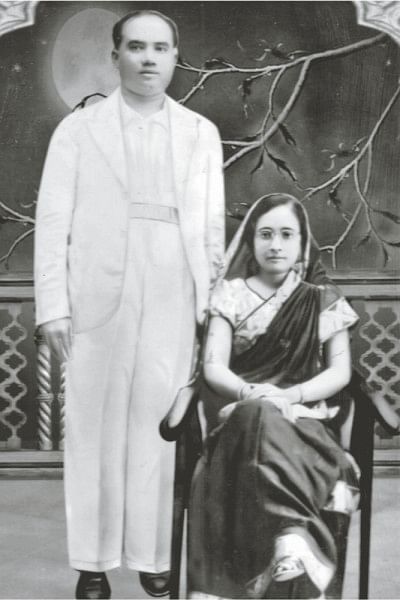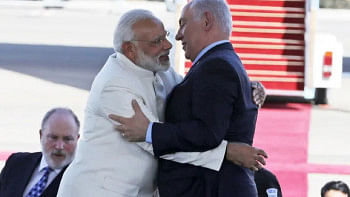“Bangla te bolun”

"Some are born great, some achieve greatness, and some have greatness thrust upon 'em."
—William Shakespeare
She was a quiet person who spoke slowly but assuredly. In my childhood whenever I visited old Dhaka to see this Nanu (sister of my own grandmother), she mostly sat on a huge palonko (old style bed) and ate paan. But behind that veil of simplicity was a person of quiet eloquence. And it was in one of those slow eloquent voices that she protested in front of the visiting leadership of Pakistan and spoke for Bangla rather than Urdu as the officiating language for a state event taking place at the Dhaka Curzon Hall in November of 1948.
Her name was Sultana Begum who was born to a family from Barisal that were descendants of Haji Shariatullah, the founder of the Faraizi movement during British India. Nana, her husband, was Zamindar Golam Mohiuddin Chowdhury of Jindabahar Chowdhury Bari and thus we always called her Jindabahar er Nanu as she lived at their family compound at Jindabahar in Old Dhaka. A mother and a housewife back in those days was expected to just accompany her husband to official ceremonies and mingle socially but on that occasion, Nanu herself was a invited guest for she was a member and an organiser of a social organisation for women (APWA).
The meeting held at Curzon Hall on that day in 1948 had a few speakers who spoke Urdu before the wife of the first Prime Minister of Pakistan Liakat Ali Khan, the main speaker for the women's programme, began her speech. When Raana Liakat Ali Khan began to approach the podium, Nanu slowly rose up and expressed her intention to speak. Organisers knew who she was and knew she was not going to just sit back down. Then, right before the main speaker was to begin her speech, Nanu spoke slowly but confidently, in Bangla, "Ekhan kar beshir bhag Urdu bojhe na, onugroho kore Bangla te bolun (Most present here do not understand Urdu, please kindly speak in Bangla)".
Nanu's protest of quiet determination showed the widespread support that the Bangla language had for an average person from East Bengal. She was approached by Raana Liakat Ali Khan who thanked her personally for her stance (even gave her an autograph). At the time, the leader of East Bengal, Nabob Khaja Najimuddin, did not wish to offend a founding father and the first Prime Minister of Pakistan by raising the issue of Bangla as a national language. But an alarm bell was sounded all through the leadership of Pakistan via many including the mouth of a simple but determined housewife from old Dhaka. Jindabahar er Nanu, through her simplicity and eloquence, was able to portray this mass support for the Bangla language by Bengalis, the majority population of the newly created state of Pakistan.
During the Liberation War, 1971, Jindabahar er Nanu sheltered many families including our own when our house in old Dhaka was shelled and burned down by the military. We walked for miles from our house in ashes through the many smoldering bazaars of old Dhaka to reach her old home in Jindabahar (near the banks of the Buriganga). The scene was not unlike those that one sees on news channels today of refugees from Syria, Libya or Yemen or even the Rohingya who have to travel through the scorched rubble of their old homes into the life of refugees in other places. We entered her home through a narrow door and then a narrow staircase and entered a grand room with high ceilings that had a touch of old grandeur. A round white marble table sat near the entrance with quill and inkwell and the high walls were adorned with huge Mughal era swords. This grand hall and two other bedrooms became our shelter for those months of the Liberation War. There, after dinner, we used to sit under an electric light or at most other times under candle light, and listened to stories of the old days from Nanu's life. Among her many stories was this little story of those quiet but determined words.
Today, one will be hard pressed to find that old grand hall or anything recognisable from that old home at Jindabahar Chowdhury Bari. The Buriganga river bridge approach road now towers over the Old Jindabahar Chowdhury Bari. Only the old mosque still stands along with the family graveyard where Nanu herself was buried in 1979. But she left us with those candle lit stories of the old days including the one on that day of 1948. It was seemingly small acts of bravery by ordinary people that paved the path for the Language Movement of 1952 where many more made the ultimate sacrifice for a mother tongue.
References
Amar Dekha Dhaka Shohor by Ametul K. Bagum.
https://en.wikipedia.org/wiki/Language_Movement
Bhasha Andoloner Itihas by Al Helal
Rashad Chowdhury works in the IT sector.

 For all latest news, follow The Daily Star's Google News channel.
For all latest news, follow The Daily Star's Google News channel. 



Comments